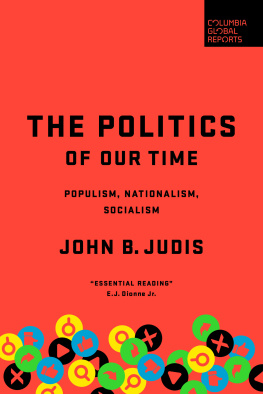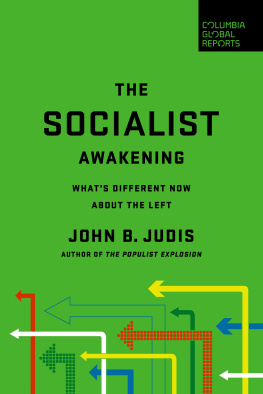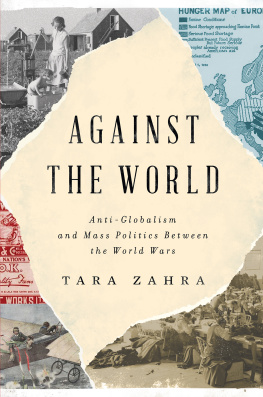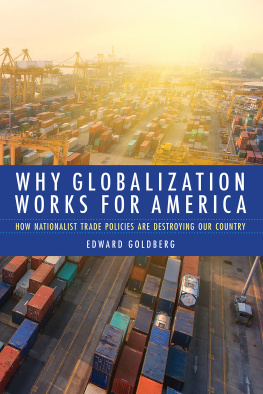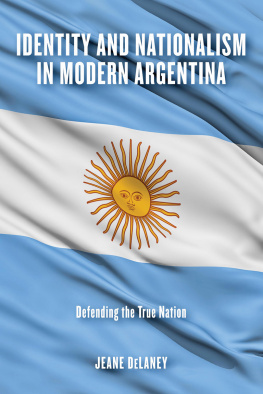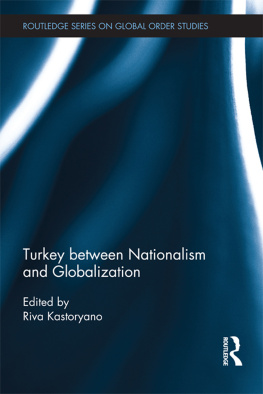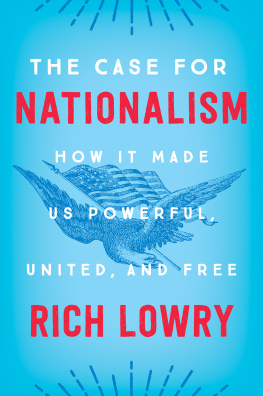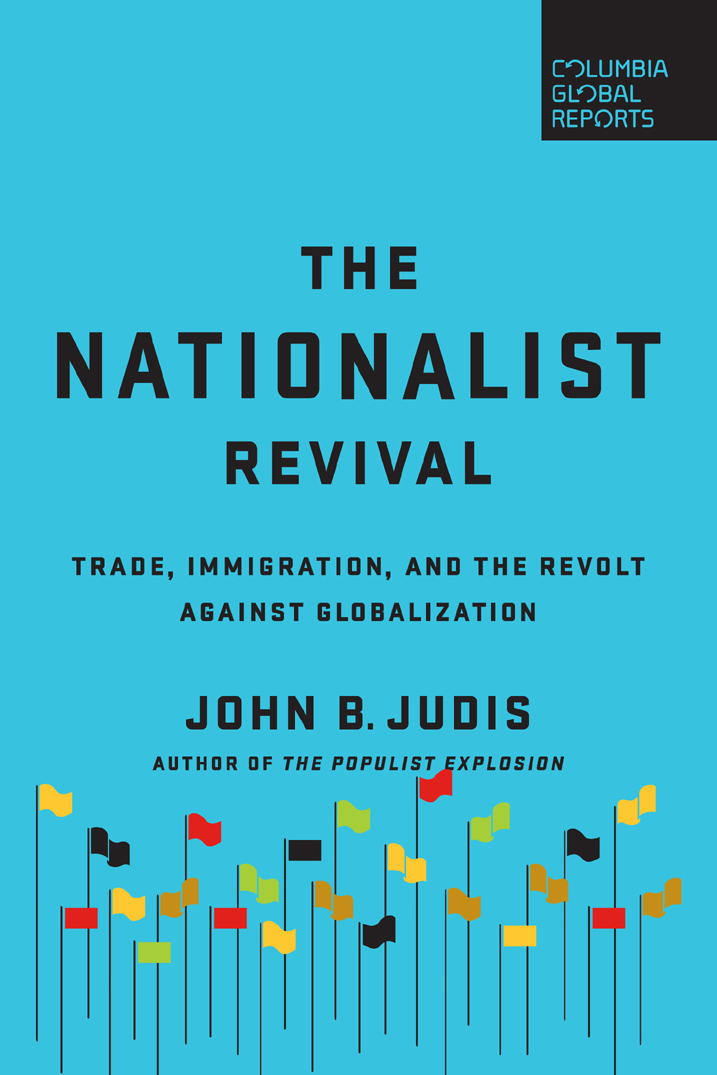Table of Contents
Guide
Praise for The Populist Explosion
A New York Times 6 Books to Help Understand Trumps Win
Named one of the Best Books of 2016 by Bloomberg
Well-written and well-researched, powerfully argued and perfectly timed.
The Economist
In November, the fate of the Republic will turn on one question: How popular is the populism of Donald Trump? The Populist Explosion [is a] cogent and exceptionally clarifying guide to a political phenomenon that is at once elusive and, yes, explosive.
Jonathan Alter, The New York Times Book Review
An intelligent guide to a phenomenon by no means over.
Fareed Zakaria, CNN
Shows why journalists who have a sense of history, and its irony, need not be bewildered by the astonishing revolt against globalized elites in our time.
Pankaj Mishra, Bloomberg
If you read no other political book this year, read The Populist Explosion by John B. Judis, which brilliantly sets out the connection to present circumstances.
Mark Mardell, BBC
A sweeping narrativerich in historical and political argumentthat ably ties together the insurgencies on both sides of the Atlantic.
Jedediah Purdy, The Nation
Writing from the left, with a qualified admiration for the populist impulse, Judis contends that populist insurgencies historically have served as warning signs of larger brewing political crises.
Tory Newmyer, Fortune
The Populist Explosion was published just before Mr. Trumps election, but that improbable victory only confirms the books thesis that Western democracies are in some ways failing to represent their citizens.... Mr. Judiss analysis is sharp and engaging.
Barton Swaim, The Wall Street Journal
A terrific short book that is a brisk tour of the horizon, of the right and left versions of populism, their history and current state, with a useful comparison of the populist upsurge in the United States and Europe. His general insight: Populism gains adherence whenever mainstream parties let ills fester.
Robert Kuttner, The American Prospect
The fact remains that in The Populist Explosion, as elsewhere, Judis hews to a much higher standard of sociological and political analysis than nearly any other American liberal. Whatever he makes of the situation, he faces it more squarely than most.
Tim Barker, New Left Review
What does history tell us about the future? John Judis, the author of The Populist Explosion: How the Great Recession Transformed American and European Politics, says that America may be just in the first phase of its new populist insurrection.
Peter Hartcher, Sydney Morning Herald


The Nationalist Revival
Trade, Immigration, and the Revolt Against Globalization
Copyright 2018 by John B. Judis
All rights reserved
Published by Columbia Global Reports
91 Claremont Avenue, Suite 515
New York, NY 10027
globalreports.columbia.edu
facebook.com/columbiaglobalreports
Library of Congress Control Number: 2018949785
E-book ISBN: 978-0-9997454-1-0
Book design by Strick&Williams
Map design by Jeffrey L. Ward
Author photograph by Hilary P. Judis


To my listserv (Dan, Larry, Joel, Sid, Ruy, Tom, Mike, and Jim)
CONTENTS
The New York Times runs a video series called The Interpreter where its reporters explain controversial ideas. In February 2018, it put up a video, entitled National Identity Is Made Up. The Times contended that, national identity is the myth that built the modern world, but it also primes us for dictatorship, racism, genocide. What does it mean to say that ones national identity is made up or a myth? Something that is made up or a myth is not true. Its a story. By that understanding, a person could say, Im not really an American, the way someone who plays in a band on the weekends, but is an accountant during the week, could say, Im not really a musician.
And what does it mean to say that our made-up identity primes us for racism and genocide? Does it prime us for other things that are not so terrible? Could it also prime us, for instance, to vote in elections? Or maybe it could also prime us to be concerned about a school shooting in Florida even though we live in Maryland and have never been to the city of Parkland and dont know any of the children who were shot?
The argument of this book is that national identity is not just a product of where a person is born or emigrated to, but of deeply held sentiments that are usually acquired during childhood. Nationalism is not simply a political ideology, or set of ideas, but a social psychology. Nationalist sentiment is an essential ingredient of a democracy, which is based on the assumption of a common identity, and of a welfare state, which is based on the acceptance by citizens of their financial responsibility for people whom they may not know at all, and who may have widely different backgrounds from theirs.
The psychology of nationalism is the basis for nationalist politics, which can take very different formson the left, center, or right. Demagogues can exploit the sentiments on which nationalism is based to promote a nativist or imperial agenda, but political leaders can also appeal to nationalism to rally a citizenry to resist foreign conquest or colonial domination. Abraham Lincoln and Benito Mussolini were ardent nationalists. The French revolutionaries of 1789 were nationalists; but so, too, was Spanish dictator Francisco Francos Falange. Theodore Roosevelt and George Wallace both claimed the mantle of nationalism.
The political direction that nationalism takes has depended on how a politician or political movement draws upon existing nationalist sentiments. Politicians, parties, and policymakers who simply discount these sentiments, or who identify them solely with right wing excessesas many in the United States or Europe have doneare likely to encourage exactly the kind of nationalism they might have wanted to avoid. That is the lesson of the rise of the Alternative for Germany (AfD), the Sweden Democrats, and Donald Trump.

Our current one-sided understanding of nationalism as the stimulus for racism and genocide comes out of the experience of World War II. After World War II, the leaders of the victorious powers tried to prevent the revival of the toxic, aggressive nationalism that had arisen in Germany, Italy, and Japan, which combined a quest for world domination with vicious scapegoating that, in Germanys case, led to genocide. In Europe, and to some extent in the United States, the very term nationalist and its cognates acquired a pejorative connotation. To call someone a nationalist insinuated some underlying sympathy for Nazis or fascists.
To prevent an outbreak of this toxic nationalism, the victors devised regional and international organizations that were intended to tamp down the urge for world domination and prevent the outbreak of ethnic or racial nationalism. These included the United Nations, the World Bank, the International Monetary Fund, and the European Economic Community. Even NATO and the Soviet Unions Warsaw Pact and Comecon were intended partly to prevent an eruption of aggressive nationalism. Together, these institutions helped prevent the outbreak of a new world war; they contributed to three decades of rapid economic growth and prosperity; and they squelched the development of the older nationalism that had sparked World War II.
Next page

